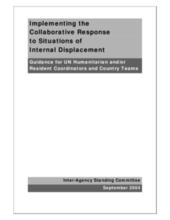Responsibility for assisting and protecting internally displaced persons (IDPs) lies first and foremost with the national authorities. In situations of armed conflict, combatants (including non-state armed groups) and occupying powers also have legal responsibilities for IDPs under international humanitarian and human rights law.
In situations where the authorities are either unable or unwilling to meet their responsibility, international humanitarian and development organizations have the right to offer their services to alleviate suffering and support national efforts. National or de facto authorities should not arbitrarily deny IDPs access to these services and should grant humanitarian organisations rapid and unimpeded access to the internally displaced. These responsibilities are reaffirmed in the Guiding Principles on Internal Displacement, which both the Inter-Agency Standing Committee (IASC) and the Inter-Agency Internal Displacement Division (IDD) have identified as fundamental to a comprehensive response in all phases of displacement and as the overall framework for their response.
©Inter-Agency Standing Committee

